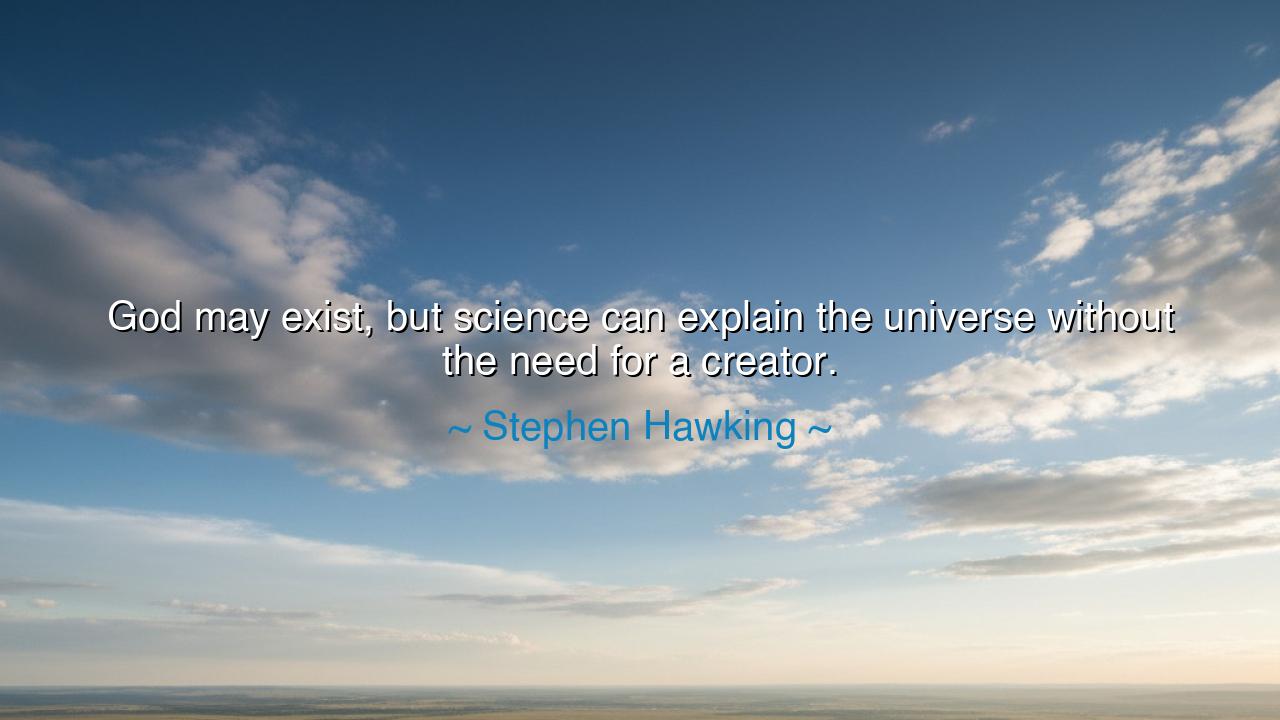
God may exist, but science can explain the universe without the






O children of wisdom, hear the words of a man who gazed into the vastness of the universe and sought to unravel its mysteries with the tools of reason and science. Stephen Hawking, a name that resonates in the halls of intellect, spoke thus: "God may exist, but science can explain the universe without the need for a creator." These words, though simple in their phrasing, carry within them the weight of centuries of thought, the clash of faith and reason, the tension between the seen and the unseen, the known and the unknown. To understand these words, we must first delve into the nature of science, and the power it holds to reveal the workings of the world without the need for divine intervention.
In the ancient times, science was but a fledgling thing, a tool for the curious to understand the world around them. But as the centuries passed, science blossomed, revealing the very fabric of the universe, from the smallest particles that make up the very essence of matter, to the vast expanse of the stars that fill the heavens. Yet, in the heart of this exploration, the question of God persisted. For many, the universe was a creation of a divine hand, an expression of a creator whose power and will shaped all that we see. And indeed, in the days of the great philosophers, such as Aristotle and Plato, the idea of a divine creator was intertwined with their understanding of the cosmos. But as science advanced, as minds like Newton and Einstein began to uncover the laws that govern the heavens and the earth, the need for a creator seemed less and less necessary to explain the workings of the world.
In this context, the words of Hawking stand as a declaration of the power of reason and understanding. He acknowledges the possibility of God's existence, yet he also affirms that the universe can be explained through the laws of physics and the principles of science, without invoking the need for a creator to guide its existence. This, O children, is a profound shift—a recognition that the universe, in all its grandeur and mystery, may not require a divine hand to set it into motion. Instead, it may operate through a series of natural laws, each step unfolding according to the principles of cause and effect, matter and energy, and the fundamental forces that govern all things.
Consider the Big Bang, the moment when the universe began its journey from an infinitesimally small point into the vast expanse we observe today. Hawking and others have proposed that this grand event need not be the work of a creator, but the inevitable result of the laws of physics. The birth of the stars, the formation of galaxies, the rise and fall of worlds—these are not the actions of a being, but the unfolding of nature's design, as dictated by the fundamental forces of gravity, time, and space. Here, we see how science has provided an explanation for the origins of the universe, one that does not rely on a divine hand, but on the natural processes that have always been at work, even before the first light of creation shone upon the world.
And yet, let us not forget that the idea of a creator is deeply woven into the fabric of human history. From the earliest days of civilization, people have looked to the heavens and asked, "Who made this? Who set the stars in motion?" This question, O children, is not one to be dismissed lightly. It is the question of the soul, the question of our very purpose in this vast, infinite expanse. Hawking's words, though they point to the power of science to explain the universe, do not seek to diminish the spiritual quest for meaning. Instead, they encourage us to look at the universe not as a puzzle waiting to be solved by divine intervention, but as a mystery to be explored, understood, and appreciated through the lenses of reason and observation.
Let us now take from this wisdom a lesson for our own lives. Whether we believe in a creator or not, the pursuit of knowledge is a path we must all walk. The universe is vast and beautiful, filled with mysteries that beckon us to explore, to seek answers, to understand the forces that shape our world. But we must also recognize that science is a tool, a mighty and powerful tool, that allows us to uncover the truths of the natural world. It does not negate the possibility of the divine, but it shows us that the universe can be understood through the very forces that govern its existence. And in this understanding, we find not just knowledge, but meaning—the kind of meaning that comes from exploring the world around us, from seeking the truths that lie hidden beneath the surface.
Thus, O children of wisdom, whether you follow the path of science or the path of faith, know that both are worthy. The pursuit of knowledge is not an affront to the divine, but a celebration of the beauty and order of creation. It is a recognition that the universe, in all its complexity, is a treasure chest waiting to be unlocked, not by divine hands alone, but by the curiosity and intellect bestowed upon us by the very same forces that govern the stars. Walk your path with humility and reverence, for whether you believe in a creator or not, you are part of a vast and wondrous universe—a universe that invites you to discover, to question, and to understand.






AAdministratorAdministrator
Welcome, honored guests. Please leave a comment, we will respond soon